- Home
- J. P. Donleavy
J.P. Donleavy: An Author and His Image Page 2
J.P. Donleavy: An Author and His Image Read online
Page 2
By such machinations the author hopes to keep his public guessing. And despite his headline dissipations he is still far from needing handouts on the geriatric come back trail. Nor had he yet been driven, as they’d all like to see him go, to the light chocolate coloured walls of the boarding house room. From whence he hobbles unshaven to sell blood every time a manuscript returns special delivery and rejected by a publisher.
But still now, creeping into latter middle age, there’s an image left, carefully cultivated and lurking behind each novel the writer published. And that is the novel, not yet ready, that he never published. Which, when he did, would turn the tide, already beginning to slowly wash the author right out of one Who’s Who after another. This is the big book. The one the author has always secretly been working on. Kept behind bars in packing cases in the basement of the Federal Reserve Bank at 33 Liberty Street. The major work, the deeply serious one for which the author had all the warm up publications. Behind a door weighing ninety tons, it sits there in the subterranean vault, five hundred thousand words safe from critics and beyond the chequebook blandishments of publishers. Any moment now, the last orgy of work upon it will be begun. When finally published, journalists will take off their typewriter covers and say, here at long last, after all those awful pot boilers, the germ of promise sown so many years ago now blossoms to make us tremble in our tracks with the rumble of printing presses.
But the author ends as he began. If ever he did begin. Pained in isolation. Pained by glad facing among the cocktails. Further away than ever from the kindred souls to whom he sent the songs he sings. Alone. Again locked up in his own tiny world. Haunted a little by the ricochets of all the accumulated images. Fading as they come back to tempt yet another change. And hope to sell another book. But you know no matter what you do the world will always finally turn its face away. Back into all its own troubled lives. Busy to be seen with a new pair of shoes and heard with another author’s name. Forgetting what you wanted them to see. Silent with what you wanted them to say. And empty with what you wanted them to feel.
Except somewhere you know there will be a voice. At least once asking. Hey what happened to that guy, did he die, you know the one, who wrote that book, can’t remember his name but he was as famous as hell. That was the author. And that was his image.
1978
Tools and Traumas of the Writing Trade
One late summer sunny day during a long London afternoon perambulation and while innocently looking in the window of an old established cheese shop, the definition of what writing is all about hit me. Writing is turning one’s worst moments into money. And money is one of the motives for becoming a writer. The others are leisure and money, women and money, fame and money, and sometimes just money all alone by itself.
And to the young dreaming writer money portrays itself as a blazing blue beautiful world set on a gently nodding horizon complete with a twelve metre racing yawl. Under his captain’s hat, the author as sailor, a gentle breeze, two published novels and a currently running West End stage production behind him, he stands in the rear cockpit, binoculars at the ready, searching the evening shore ahead where on some mysterious promontory a faintly lighted dining table is being laid ready for his appearance. And he appears. And out of the flowery landscaped darkness folk rush to him and say, their eyes glistening, gee your conversation is even more beautiful than your book, and gosh, you’re even better looking than your photograph.
And as a youthful American, such dreams are dreamed sitting at one’s kitchen table over the milk and peanut butter during the years of high school while Ma is saying, ‘Haven’t you done your homework yet, Junior.’ ‘But Ma, I’m going to be a famous writer and a millionaire.’ Ma says, ‘Drink your milk and go and do your homework. How do you ever expect to get a job with the Asbestos Company.’ A few minutes later when no one is looking, Junior has closed his biology book and sneaks out into the summer evening for an illicit smoke with friends. Walking along the maple shaded street, rinding that no one else believes his dream yet saying behind a shaking fist, ‘I’ll make one hundred thousand dollars with my first best seller and then they’ll be sorry.’
And so the budding writer, among his uncaring sceptical cronies and invariably hostile family, learns that being a writer is antisocial, anticommunity, because it’s not a job, and that the natural reaction of the immediate working society around him is to destroy or drive out the bad apple in its midst. Who would want to be a millionaire without first filling out an application form. Or who would forsake an afternoon’s tennis to lonely reconnoitre in the local cemetery. And now when he meets with his friends and they say, ‘Hey, what are you really going to be when you grow up’ and all one can say is, ‘Rich’, and they say, ‘How’ and you say, ‘I’m going to be a dentist’, the writer has picked up a useful tool in his survival, cunning.
As the high school years go by, the first steps towards the great dream ahead are taken when the poems get written. The girls say, ‘That’s really beautiful, but you copied it out of a book.’ The boys say, ‘Gee you’re a Shakespeare.’ College approaches. The four years of indoctrination for the corporation. Or the grooming of a literate mind till it’s full of the most recently accepted critical opinions that can be safely repeated for graduation. This is where the young writer founders. And toys with his maiden trauma. As he offers his scribblings for appraisal, he’s told, ‘Get your degree first, your security, then think of becoming a writer.’ And during this testing time the road ahead fatefully forks, when you can no longer think or dream of becoming a writer, you must be a writer. Or else get shunted off on an English course in literature to the conniving assassinating world of criticism, grants and fellowships, rarely to return to that of writing.
But collegiate or not, one more indoctrination is inevitable. And most traumatic of all. The nice girl turns up. She likes you because you have a beautiful sensitive mind. You’re so good at judging people, so good at turning the world into visions. She says, ‘You would look so handsome making decisions behind a desk. Just what they’re looking for on Madison Avenue. And then we could move to Scarsdale or Sunningdale out of all this filthy mess.’ And so, if you haven’t told her to go to hell, and she’s still stealing from the supermarket, one day sometime later a little baby is born. Along with the infant screams and sleepless nights, the relentless sledgehammer of responsibility lands. You get to recognize the tiptoe to the apartment door of the rent collector and the disguised voices of the terminators of gas and electricity. Plus the soft uncomforting words of the bank, ‘But you’ve got no regular job or collateral for a loan.’
And so we come to the first indispensable tool of the writer. Money. And by money is meant capital. For only with capital can come independence and the long term purchase of time. The writer’s most important ingredient. Time to wake up in the morning haunted with the anxiety that the money is running out. Time to sit at the typewriter putting down that first page, haunted by the anxiety that one will never write a second. And finally time to realize that you may need a year, or two or three. When surely by that time you’ll be in the asbestos plant or the poorhouse.
On your first pages the struggle may go on for weeks. The sentences trying to find life. That can begin to weave a story that lives. Which in turn can lend you confidence to continue on. Spelling out the words you clutch from your brain. And that conjure on the page a meaning you want to mean. Until suddenly, one day, a chord is struck. It will have a strange reverberating music. But when you hear it you’ll know you’re on your way. Able now to further brazen through the chronic prevailing ignominy. And at last sure, when no one else is, that you’re a writer.
And what did you do for money. Only God knows. And it would embarrass him. But now you have a desk, a typewriter, carbon paper, a wife screaming why don’t you get a job. You also have the vague but burning presumption that you have written something that someone else might want to read. And also make your Ma and Pa drop dead with shame. Plus
a slew of relatives who will also tell them I told you so. But all this brings into function the second most important tool of the writer, a suicidal and ruthless nerve. It’s a trait which makes your friends a trifle shifty eyed and much uncomfortable. And with it there comes the slow but sure alienation, a stepping back and apartness from the world around you. For the born writer this has happened years ago, when his girl friend or later mother in law said he had a dirty disgusting mind. Or when, for his evil influence on other students, he was expelled from high school or kicked out of college. And leaving all your old neighbourhood friends to whisper, ‘He isn’t the same George we used to know when he told us he was going to be a dentist.’
And along with this alienation an author finds his next best all purpose tool is that of an empty head. From which learning and knowledge, the two greatest enemies of a working writer, have been eliminated. Which alas will provoke an oft heard refrain about you, ‘Holy cow, not only can’t he spell but he’s illiterate too.’ But your business now is to see and hear both in yourself and in the world around you. Especially involving the incidents which caused you the most acute embarrassment. These, your uninhibited observations and feelings, are the building bricks and cement. Variously styled by others as malicious rumour and falsehood. They accumulate and get mixed in dreams, conversations and drunken brawls. And get coloured by despairs and joys and tempered by passing time and morbid hangovers. To finally unearth during the long bouts of lonely despair as the threads which bind and weave your story.
But hopefully, and amid protests from those nearest and dearest that ‘My God that’s not literature that’s libel’, this narrative as it unfolds becomes a novel. And the writer has found that the everyday tools he has needed have not been a university course in English, journalism or writing, but the accumulated gossip, hearsay and scandal circulating among his more steadfast cronies, a thousand or more dollars or pounds, a typewriter, a disciplined use of it for three or four hours a day, the finishing of a page, the rewriting of it, watching each sentence catch fire and bring to life another and that another, until one day arrives. The writer reaches over on his desk and pinches between thumb and forefinger a stack of paper. He lifts it and it has weight. He punches holes, threads through ribbon, or nuts and bolts, puts on a cardboard cover, and suddenly he’s got a manuscript. This is where the traumas begin.
All the old friends in search of their life’s safety are gone on their ways to higher degrees. Or to steady or not so steady jobs mending tracks on the railroad. One penurious oddball is left. Like you he’s decided that for the time being he’ll continue doing what everyone else describes as nothing. He frequently on his hungry evenings comes and scrapes the bottom of the spaghetti bowl. You say, ‘Read this.’ He says between mouthfuls and brief perusals of your heartfelt scurrilous prose, ‘You’re crazy.’ You pull away the bottle of wine. As he tugs back the manuscript for another look, he says, ‘Wait, maybe you’re a genius, but get a second opinion.’
The author studies the literary pages of newspapers. And in his incredible innocence mails off his manuscript to the most prominent publisher in sight. Meanwhile he peruses fashion magazines listing town houses and country estates. He looks over the Daimler limozines at the local suppliers. And takes an interest in yachts providing a library and study attached to the owner’s suite. But as the silent days lengthen as they accumulate, he goes back to wandering, waiting and contemplating in his favourite cemetery again. And when with a last handful of change he buys a beer in his local pub, he still answers, ‘Nothing’, to an old pal who asks suspiciously, ‘What are you doing now.’ But next morning he knows. For at the end of three long weeks a crushingly bulky reply has at last come. From the awe inspiring firm under whose banner these past twenty one days you dreamt you would take your first bounding steps to fame and fortune.
Dear Sir,
Thank you for giving us the opportunity of reading enclosed returned herewith but we do not feel it suitable for our lists.
Yours faithfully,
The Editors.
The first thing you go and do is to sit and write. A furious reply. The first and rudest of which is torn up to write another.
Dear bunch of Editors,
You stupid bastards have just turned down what will be one of the great best sellers of the last half of this decade.
Yours sincerely,
The Author.
And alas, as the glowering wife loudly smoulders and innocent kiddies cower quietly, you realize that the words of both your letter and manuscript are just as effective as throwing the paper on which they are written in a ball as hard as you can against the sky scraping massiveness or genuine Georgian brick in which these titans of the published word reside, daily solving the world’s toughest crossword puzzles and trading epigrams with colleagues on their hourly visits to the water cooler.
But the penurious oddball who, along with his deep researching of his own non existent sex life, has been philosophizing elsewhere. He has on the breeze of his eccentricities sailed into the current latitudes of literature and is lapping up a more lavish lasagne and grabbing at the now vintage wine. He says, ‘I have a friend who has a crazy manuscript.’ And the thin, poem writing many university educated blonde says, ‘Hey gee isn’t that interesting I have a friend who is a publisher.’
So in a big building sits a guy behind a desk who majored in English and now makes thirty thousand dollars a year, leaning against a wall at various cocktail parties with that look, ‘I’ve read Proust in the original, straight through, one summer in my cottage up on the Cape, and I am sure there is no new Proust budding in the Bronx.’ However, uncrossing his legs and pulling up his English woven socks, he condescends to continue the never ending search for new talent and enduring penmanship and says, ‘Let us have a look at this crazy manuscript.’ And of course this is the novel which would make one’s folks, if they read it, drop dead. This publisher reads it. He finds he is glued to every word and shocked into the bargain. He is certain that this is not literature. And if it is it would not make him look good at his next cocktail party. And so carefully disguising the offending tome with the nice blue wrapper borrowed from his copy of The Shorter Oxford English Dictionary, he sneaks the manuscript back to the mailing room. And there with it safely parcelled, he writes that under separate cover is returned this volume which the editor finds not only unpleasantly unsuitable but also that season’s leading candidate as the most unlikely book for publication.
One more trauma and the author learns a rule, that what is original and vital, and offered, will be rejected. This rule is rarely ever changed, neither by fame, fortune, nor acclaim, and rejection will happen again and again. For in the nature of publishing everyone is searching for what is unhackneyed and alive while handing over a cheque to an agent who has an imitation of last season’s best seller. Which the publisher’s representatives think they can subscribe in hundreds of copies at the bookstore. So where does this leave the author. It leaves him thoroughly depressed and back again among his neighbourhood tombstones wondering if any soul alive out there will ever hear him, so thoroughly has the loud world quelled his tiny voice.
But the word has at last got round. That the author looks well in bathing costume. And has a criminally dirty mind. Another young woman, a graduate, a doctor of modern English literature, says so. And that there is a socially redeeming aspect to the honest and explicit treatment of sex in his manuscript. And the word sex is soon described as brutish and unbridled. And these words in turn gain those of shockingly explicit. And the whole damn reader’s report goes whispered hurriedly from tipster to publisher whose legal advisers counsel that the sodomy is defensible on literary grounds plus a prosecution would immensely help sales. And suddenly the word carnal gets converted to ‘Our Standard Contract’. And this latter, as the author sits trembling reading it, is being amended with their most recently fairest option clause for the writer’s next six books on the same terms. And meanwhile, ‘Have you
an agent.’ The answer, ‘No’, and the reply, ‘Just sign here.’ But through the remainder of that unforgettable afternoon the author’s ears are thundering with printing presses, the flash of camera bulbs, and the hundreds of blonde smiling women fresh in from Scarsdale and Sunningdale with their books to sign and themselves free that evening to dine with the author at the Ritz.
But months go by. As the publisher’s editor, under the guise of correcting the spelling, attempts to rewrite one’s book in standard English. Next the author accidentally gets a peek at a proof of the jacket. And one looks for one’s name. And finally finds it. And says to the publisher, ‘Make it bigger,’ and he says, ‘That’s the regulation size for all first novels.’ Slowly the author gets a changing glimpse of his future. His name insignificantly there on the luridly illustrated cover. And prophetically written on a tombstone astride which is the naked heroine.
Next, the publisher’s list is published. And the unadorned print doesn’t look half bad. Nor the blurb describing the author as this untamed child of his times whose soul must speak out. And now once again the writer sees himself at long long last standing on high ground, the sailing skiff if not the yacht would be delivered from the boat yard soon. Meanwhile on the three figure advance, the first figure of which is one, his wife has had dental treatment, his children new shoes and he, a new seersucker suit. The wind is gently blowing through his recently tonsured hair. As the distant roar of the printing presses rises. And then subsides. To a soothing spiritual sound. Once heard never forgotten. Of fresh banknotes floating endlessly down from heaven.

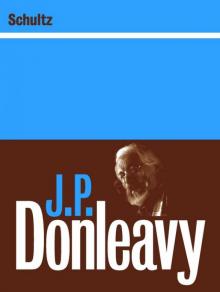 Schultz
Schultz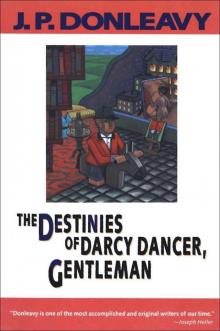 The Destinies of Darcy Dancer, Gentleman
The Destinies of Darcy Dancer, Gentleman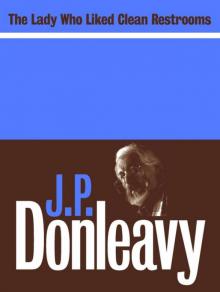 The Lady Who Liked Clean Restrooms
The Lady Who Liked Clean Restrooms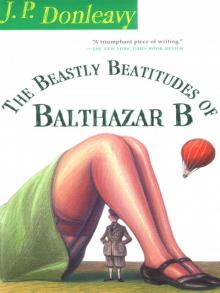 The Beastly Beatitudes of Balthazar B
The Beastly Beatitudes of Balthazar B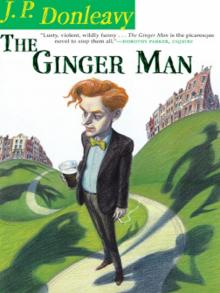 The Ginger Man
The Ginger Man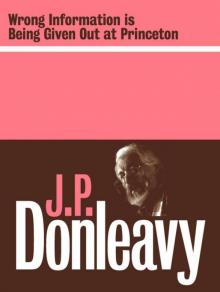 Wrong Information Is Being Given Out at Princeton
Wrong Information Is Being Given Out at Princeton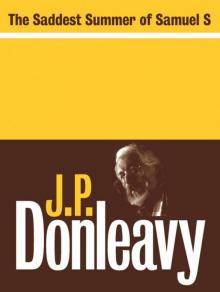 The Saddest Summer of Samuel S
The Saddest Summer of Samuel S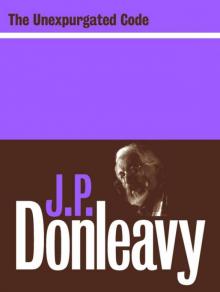 The Unexpurgated Code
The Unexpurgated Code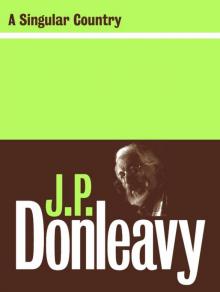 A Singular Country
A Singular Country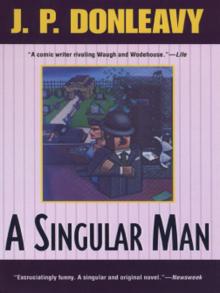 A Singular Man
A Singular Man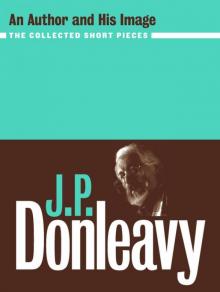 J.P. Donleavy: An Author and His Image
J.P. Donleavy: An Author and His Image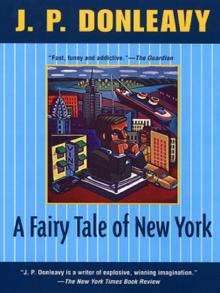 A Fairy Tale of New York
A Fairy Tale of New York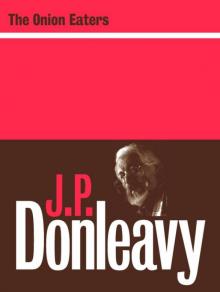 The Onion Eaters
The Onion Eaters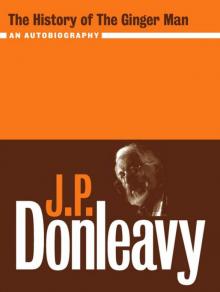 The History of the Ginger Man: An Autobiography
The History of the Ginger Man: An Autobiography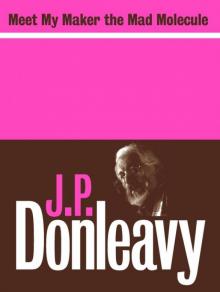 Meet My Maker the Mad Molecule
Meet My Maker the Mad Molecule Leila
Leila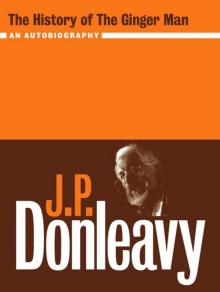 The History of the Ginger Man
The History of the Ginger Man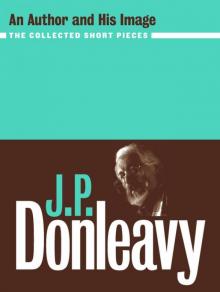 J.P. Donleavy
J.P. Donleavy